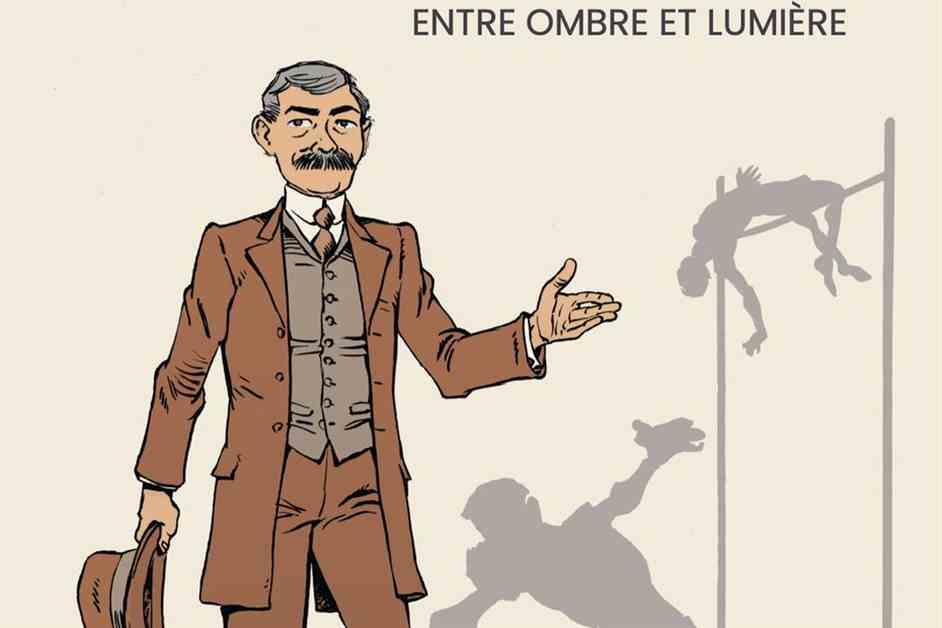Controversial Legacy of Pierre de Coubertin Revealed in New Graphic Novel
As the 2024 Olympics approach, a new graphic novel sheds light on the controversial aspects of Pierre de Coubertin, the French founder of the modern Olympic Games.
Who was Baron Pierre de Coubertin? With the upcoming Olympics set to be celebrated in Paris from July 26 to August 11, Xavier Bétaucourt and Didier Pagot have recently published a graphic novel about the French creator of the Olympics. A biography that explores both the shadow and light of his life.
The official communication surrounding the Olympic Games does not seem to highlight Baron Pierre de Coubertin. The reason? Some elements of his life are surrounded by controversy. The graphic novel, “Pierre de Coubertin: Between Shadow and Light” by Xavier Bétaucourt and Didier Pagot, published by Steinkis Editions, reveals an unknown side of the man.
The narrative device imagined by the two authors follows a conversation between Edgar Pirolu, a journalist, and a second fictional character. Both are attending the opening ceremony of the 1936 Berlin Games. These games are at the heart of the most crucial controversy surrounding Coubertin: the close ties he allegedly had with Hitler and his admiration for Nazi ideology.
Through this discussion, the nuanced stance of the two authors of this graphic novel is evident. They make the fictional character of the journalist say that Pierre de Coubertin is “more complex than he appears”: both “reformist and conservative.”
Further into their graphic novel, the two authors have the character of Edgar ponder on what the Baron truly thought of the Berlin games; they attribute to him the opinion that he was being used.
Recent research conducted by journalist Aymeric Mantoux corrects this narrative caution: “It’s a thank you letter from Coubertin to Hitler for all the commitment the Reich had to the Olympic Games project […] Coubertin was very involved in the preparation of the Berlin games,” he asserts during the release of his biography “Pierre de Coubertin, the man who didn’t invent the Olympics” by Faubourg Editions.
The graphic novel also highlights other hidden facets of the Baron. It is revealed that while he advocated for the Olympics to be held in Africa, his primary concern was not to treat all participants equally, regardless of their country of origin.
For him, expanding the Olympic Games to the African continent was a means of controlling and monitoring the local population. “From the first days, I was a fanatical colonialist,” wrote Pierre de Coubertin in his memoirs (CIO Archives, 1936).
It is also discovered through the graphic novel that Coubertin’s views on women had a misogynistic turn. He always opposed the creation of competitions open to women. Sport and femininity were unthinkable in his eyes.
An “Olympiad of females would be impractical, uninteresting, unaesthetic and incorrect,” wrote Pierre de Coubertin in the Olympic Review, No. 79, July 1912.
His legacy appears highly problematic today. Some want to celebrate the character in its entirety, while others only want to remember his name, not his memory, and attempt to excuse his ideological views.
His great-great-niece emphasizes the context of the time to excuse her ancestor’s remarks. The International Olympic Committee (IOC) insists that “the number of women participating in the Olympic Games multiplied by six under the presidency of Baron de Coubertin.”
An official tribute is planned at the Sorbonne on June 23, but the Minister of Sports, Amélie Oudéa-Castéra, does not intend to attend. According to her entourage, she will participate in an event as part of Olympic Day and the Torch Relay.
The Grévin Museum has chosen to include him in their wax portrait gallery by next July.
The 7th arrondissement town hall will host an exhibition organized by the Pierre de Coubertin Family Association titled “Genius of Sport” starting June 24.
The legacy left by Pierre de Coubertin remains controversial. To this day, some want to celebrate the character in its entirety, while others only want to remember his name, not his memory.
With Matthieu Guinot and Didier Morel


















